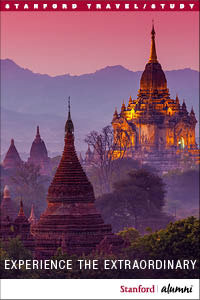ONLINE ONLY: Who's for Helping China?
By Joel McCormick
Is it fair to ask if institutions like Stanford should be worrying about China's problems when the United States is on the ropes and the People's Republic is within sight of displacing Japan as the world's second largest economy?
"I've had it asked ten times," says Scott Rozelle, director of the China-focused Rural Education Action Program (REAP). "'How do we ask our alumni to give money that ends up helping poor people in China?'"
Whatever other answers there may be, one can be found in the Stanford International Initiative. That called on the University to focus its collaborative might on enhancing international security, national and local governance, and individual well-being—as President Hennessy put it to the Faculty Senate in May 2005, to "affirm that Stanford has a special role to play in addressing these issues and providing real-world solutions."
Rozelle argues that REAP's work in China responds directly to that call to action. But it hardly means Stanford is ignoring needs closer to home, he says, ticking off a shortlist of community initiatives launched in its own backyard.
He also sees good practical reasons for helping China. "Let's be honest, the future of the U.S. is as tied to what happens to [Chinese] kids and their entry into the labor market as to what happens in East Palo Alto." Besides, helping China's rural children prepare for a job market vastly different than the one their parents faced makes more sense than waiting on the sidelines for the political and social consequences of leaving them to stagnation and despair.
Nick Hope, director of the Stanford Center for International Development, couldn't agree more. Hope has spent nearly 25 years watching China develop, much of that time from his perch at the World Bank, latterly as China country director.
Hope thinks, in development terms, we've arrived at "perhaps the most exciting time in human history." Add India and China together and you have two-fifths of humanity experiencing rising prosperity for the first time, putting these enormous countries within a generation or so of enjoying a modest standard of living and "a modicum of dignity."
Both conceivably will challenge the United States one day in terms of their economic size, and for Hope this raises a central question: How "statesmanlike" will the United States be in giving them a voice in decision-making? "The decisions made over the last half century were mandated by the U.S.," he says. "It will be a great test of U.S. democracy if it can extend that [mandate] to others."
Since he mentions it, won't helping China's poor only further entrench one-party rule and delay the mainland's transition to democracy? Hope says it might in the short term. Food usually does take precedence over governance at first, he says, but priorities typically change as incomes in developing countries rise. China's per capita income now tops $3,000. "By about $4,000, people start to become concerned about having a voice in their own governance and become less occupied by immediate material needs of living."
China's incomes should be within that upper bracket this year if International Monetary Fund projections are right. At this point, people typically start to look more critically at issues like education and public services; those in the cities, now run by Beijing-appointed party brass, start to clamor for different methods of governance; and eventually party factions representing the intelligentsia, workers and other groups start to appear.
"You already see it on the Internet," Hope says. Backroom dealing starts to decline as factions see more advantage in vying for influence in a more public way. "I expect to see much more public debate—it's beginning to happen already to a degree—and that will accelerate in the next three, four or five years.
"My sense is that by 2020 we'll see fairly substantial political change." Maybe not in the form of political parties, but Hope expects to see at least the party factions of the sort that emerged in the Liberal Democratic Party in Japan and other ruling parties in Taiwan, Indonesia and elsewhere. "These were mechanisms that were put in place to maintain entrenched power."
Often as not they eventually break away. (The Democratic Party of Japan, so loudly credited with breaking the near 50-year rule of the LDP in elections last year, started out as a faction within the LDP.)
Oddly enough, poorer rural folk are the first Chinese to get a taste of democracy. More than 80 percent of villages now elect their leaders, albeit from among candidates drawn from party lists. Such elections have proven effective for clearing out the rogues, Hope says. "This is a way to protect the reputation of the central party." Democracy: Party tool.
Larry Diamond, a senior fellow at Hoover and director of the Freeman Spogli Institute's Center on Democracy, Development and the Rule of Law, sees the same trend Hope lays out. "We have a tremendous amount of comparative evidence showing that attitudes and values become more democratic and more demanding of autonomy and self-determination as people become more prosperous and informed and better educated," says Diamond, '73, MA '78, PhD '80.
"If all this development succeeds, sure, in the short term it may add some legitimacy to the regime, but in the longer term it's going to contribute to other dynamics that bring about democratic change."
Actions
Related Articles
-
Let Me Introduce Myself
September/October 2008 -
The Menace Within
July/August 2011 -
The Persecution of Daniel Lee
July/August 2011 -
What It Takes
November/December 2013 -
The Effort Effect
March/April 2007








Comments (0)